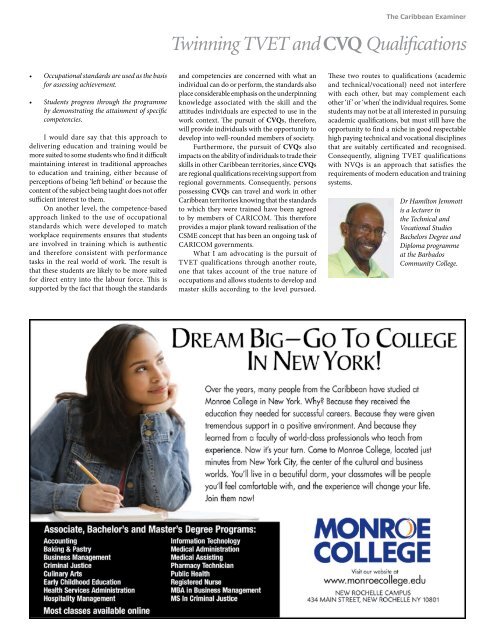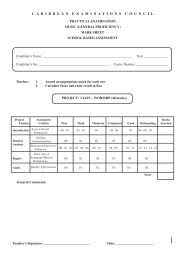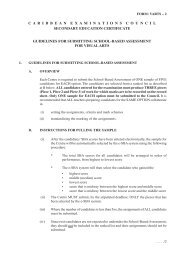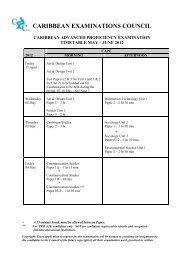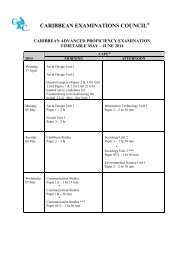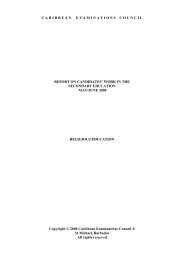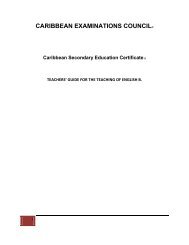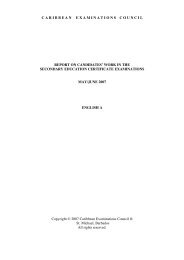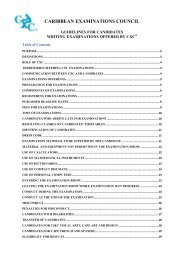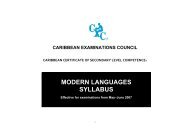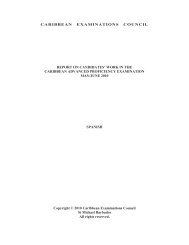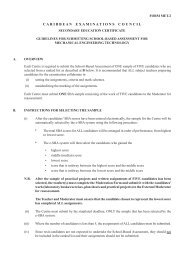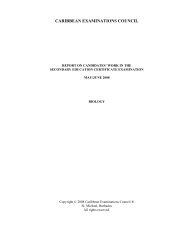The Caribbean Examiner ⢠Vol 9 ⢠No 1 ⢠May 2011
The Caribbean Examiner ⢠Vol 9 ⢠No 1 ⢠May 2011
The Caribbean Examiner ⢠Vol 9 ⢠No 1 ⢠May 2011
Create successful ePaper yourself
Turn your PDF publications into a flip-book with our unique Google optimized e-Paper software.
<strong>The</strong> <strong>Caribbean</strong> <strong>Examiner</strong><br />
Twinning TVET and CVQ Qualifications<br />
• Occupational standards are used as the basis<br />
for assessing achievement.<br />
• Students progress through the programme<br />
by demonstrating the attainment of specific<br />
competencies.<br />
I would dare say that this approach to<br />
delivering education and training would be<br />
more suited to some students who find it difficult<br />
maintaining interest in traditional approaches<br />
to education and training, either because of<br />
perceptions of being ‘left behind’ or because the<br />
content of the subject being taught does not offer<br />
sufficient interest to them.<br />
On another level, the competence-based<br />
approach linked to the use of occupational<br />
standards which were developed to match<br />
workplace requirements ensures that students<br />
are involved in training which is authentic<br />
and therefore consistent with performance<br />
tasks in the real world of work. <strong>The</strong> result is<br />
that these students are likely to be more suited<br />
for direct entry into the labour force. This is<br />
supported by the fact that though the standards<br />
and competencies are concerned with what an<br />
individual can do or perform, the standards also<br />
place considerable emphasis on the underpinning<br />
knowledge associated with the skill and the<br />
attitudes individuals are expected to use in the<br />
work context. <strong>The</strong> pursuit of CVQs, therefore,<br />
will provide individuals with the opportunity to<br />
develop into well-rounded members of society.<br />
Furthermore, the pursuit of CVQs also<br />
impacts on the ability of individuals to trade their<br />
skills in other <strong>Caribbean</strong> territories, since CVQs<br />
are regional qualifications receiving support from<br />
regional governments. Consequently, persons<br />
possessing CVQs can travel and work in other<br />
<strong>Caribbean</strong> territories knowing that the standards<br />
to which they were trained have been agreed<br />
to by members of Caricom. This therefore<br />
provides a major plank toward realisation of the<br />
CSME concept that has been an ongoing task of<br />
Caricom governments.<br />
What I am advocating is the pursuit of<br />
TVET qualifications through another route,<br />
one that takes account of the true nature of<br />
occupations and allows students to develop and<br />
master skills according to the level pursued.<br />
<strong>The</strong>se two routes to qualifications (academic<br />
and technical/vocational) need not interfere<br />
with each other, but may complement each<br />
other ‘if ’ or ‘when’ the individual requires. Some<br />
students may not be at all interested in pursuing<br />
academic qualifications, but must still have the<br />
opportunity to find a niche in good respectable<br />
high paying technical and vocational disciplines<br />
that are suitably certificated and recognised.<br />
Consequently, aligning TVET qualifications<br />
with NVQs is an approach that satisfies the<br />
requirements of modern education and training<br />
systems.<br />
Dr Hamilton Jemmott<br />
is a lecturer in<br />
the Technical and<br />
Vocational Studies<br />
Bachelors Degree and<br />
Diploma programme<br />
at the Barbados<br />
Community College.


